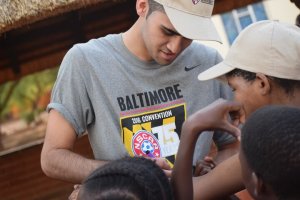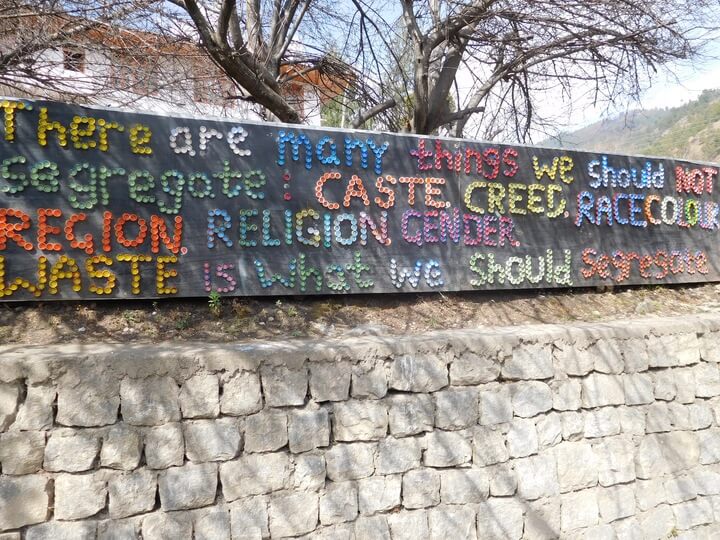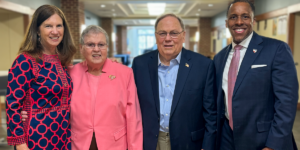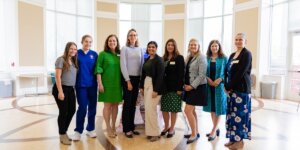Recent international journeys raised Shenandoah University travelers’ global awareness and, in the process, broadened their understanding of issues and policies affecting their home countries.
For example, when Rodrigo Casteriana, a Shenandoah University junior majoring in Spanish and minoring in international studies, traveled to Botswana during spring break 2016 as part of the university’s Global Citizenship Project (GCP), he brought home insights that he’s applied to the United States.
Travel provides eye-opening experiences

Photo of Rodrigo Casteriana in Botswana by Corrie Wernle
“You start noticing more things,” as a result of travel to another country, he said, adding that after his trip, he connected southern Botswana’s massive water shortage to the drought affecting the western U.S. Botswana has suffered a lack of rain as the western states have, said Shenandoah University Counseling Center Clinician Amy Scott, who also traveled through GCP to Botswana. However, unlike the U.S., Botswana lacks the infrastructure to connect the country’s northern region, where there’s plenty of water, to its southern region, Scott said.
Casteriana, who was born in Uruguay and moved to the U.S. at age 7, also traveled to the Dominican Republic two years ago through a different international effort at Shenandoah. With his travel experiences, he’s grown to feel “like everyone is somewhat connected.” He and Scott noted that nations can share resources, such as education, to help other countries. If children are well-educated in Botswana, Casteriana said, perhaps they can grow up and correct their nation’s water problem, as well as other situations.
Botswana’s concerns also “make our daily problems seem not so drastic,” Scott added. “I think you’re more aware that everyone has the same basic needs.”
New perspectives on domestic issues
Shenandoah’s GCP allows students, faculty and staff to travel to a variety of locations around the world during spring break in five groups of 10 or 12, often providing travelers with their first international experience. Members of the university community submit essays to apply for the trip, and a committee chooses participants. In 2016, GCP groups traveled to Botswana, the Dominican Republic, Bhutan, Norway and Ecuador. Shenandoah also offers a variety of short-term Global Experiential Learning trips for credit, as well as more traditional study-abroad experiences.
For Anna Wilson, a junior exercise science major and pre-physical therapy student, a 2016 GCP trip to the Dominican Republic made her see the U.S. immigration debate in a different light. She learned that in the Dominican Republic, people of Haitian descent often experience extreme difficulties in gaining citizenship and can’t acquire the paperwork they need for certain jobs, or even to attend school. These families often live in extreme poverty. So, when she hears political candidate closer to home talk about preventing immigrant children from attending school, she said she knows she doesn’t want political policy to create a poor, uneducated population.
The human connection
Senior psychology major Victoria Finney had only been on a cruise to the Bahamas and on a trip to Niagara Falls (“Canada, sort of,” she said) before going to Bhutan with a 2016 GCP group. “Everything about it was amazing,” she said of the trip, which exposed her to an entirely new culture, which, she was happy to discover, valued and appreciated humor. The group’s tour guides loved cracking jokes, she said.
While Shenandoah University travelers grew more aware of certain international and domestic issues as a result of their GCP journeys, they did so by making very human connections. Casteriana said he’s fascinated by learning about other cultures. He and his group were so engaged by what they found in Botswana, he said “We didn’t want to leave.”
Interested in learning more about international travel at Shenandoah University? Visit our International Programs page!
Featured photo taken during the 2016 GCP trip to Bhutan




